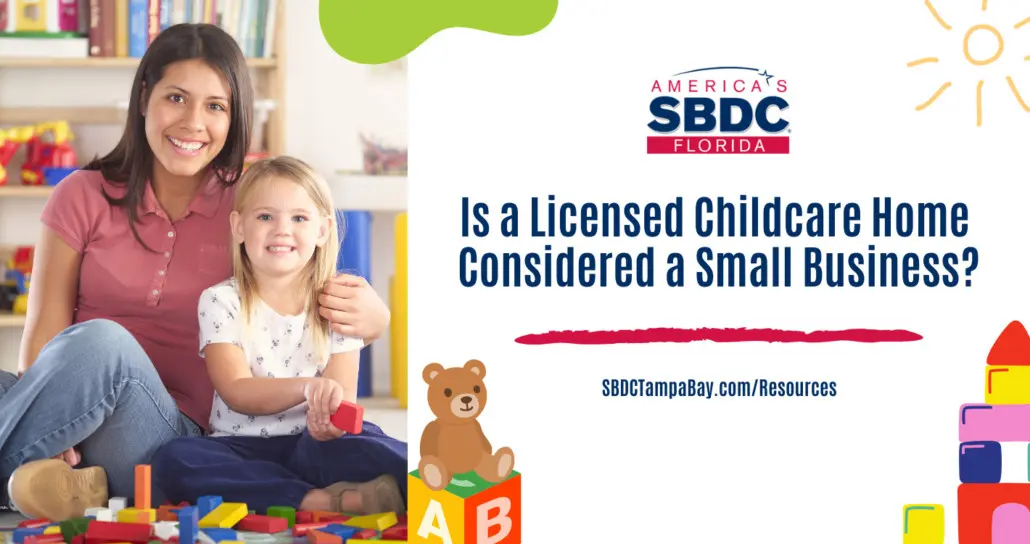Is a Licensed In-Home Childcare Considered a Small Business?

by Retta Parsons | May 31, 2023
You work 60 hours a week, addressing the needs of a variety of target markets, while balancing inventory, licensing requirements, equipment maintenance, documentation, etc. Sound familiar? This is the reality for many entrepreneurs. They frequently accept this lifestyle because they are passionate about their products/services and meeting their customers’ needs, but when we visualize an entrepreneur what do we see? Is it someone like Dave Thomas of Wendy’s or, possibly, Henry Ford of Ford Motor Company? Or do you think of the person who runs the licensed childcare home in your neighborhood? A licensed childcare home proves to be a small business that encompasses all or more of the statements previously made.
Licensed Childcare Home Requirements
Parents/caregivers frequently bring children to a licensed family childcare home with little thought to the type of work involved in owning and operating this type of small business. However, consider the following strides a small business such as a childcare facility must go through to stay in business:
- In the state of Florida, all homes providing care for children on a regular basis, and for which a payment occurs, must be licensed, with very few exceptions.
- The handbook containing the rules and regulations, under which a licensed home must operate, is 49 pages long.
- Most childcare establishments are open from 6 am—6 pm, often making a 60-hour work week for the provider.
- There are yearly professional development requirements that must be met to maintain licensing. These trainings usually occur at night or on weekends.
- Providers are busy cleaning up after meals and morning learning activities while children are napping. Once finished, they have documentation requirements for each child that must be met and maintained for licensing, food program reimbursement, grants, etc.
- The provider must maintain reliable service so that parents/caregivers are able to be employed. This means items such as illness, doctor’s appointments, vacations, etc., cannot be frequently addressed as it would mean closing the business for a period of time.
Licensed Childcare Home Restrictions
Many small business owners work to expand their business’ capacity and market to increase profit. Licensed childcare homes, by contrast, can care for a maximum of six children at a time. This restriction provides a limit to the amount of profit that the business can produce. Therefore, to increase profit, a provider must raise prices. Given the current financial conditions experienced by most households in America, a price increase at the childcare home could produce exponential hardship on the “customer.”
The Future of Childcare Home Small Businesses
With limited profit and capacity potential, long hours, licensing requirements, restricted time-off, and public health concerns, it is little wonder that many licensed childcare home entrepreneurs have closed their doors in recent years. An assisting factor to the solution in this reality could be a paradigm shift for how childcare providers are viewed. If we see providers as the educated, hard-working, professional entrepreneurs that they are, our entire country could benefit. Working adults could be more productive and our children, this country’s corps of future leaders, would be provided with an abundance of reliable, consistent, and nurturing care.
Although a licensed childcare home is considered a small business, due to the given trials and tribulations they must endure throughout the lifecycle of the business, many childcare homes must charge their customers more to provide their services, or close their doors for good. If you are thinking of opening a childcare home facility soon, it would be wise to keep this information in mind before making any decision.





Retta Parsons
Consultants, Hillsborough, ParsonsFlorida SBDC at Hillsborough County
Specialty: Start-up, Bookkeeping
Retta Parsons brings a wealth of knowledge and experience in business management and public administration to her role as a business consultant. She previously served as CEO of Shiawassee United Way. In that position, she provided leadership to ensure the construction of a $26 million county medical care facility. She also led the change process and alliance establishment that resulted in the implementation of United Way 2-1-1 in Shiawassee County. Parsons also served as a training director for Girl Scouts, where each year she managed the delivery of approximately 124 trainings for more than 700 attendees. Parsons enjoys being active in the community. Past roles include chairperson for the State of Michigan, Department of Health & Human Services, Shiawassee County, board; chairperson of the Shiawassee Human Services Council; and ambassador for the Shiawassee Regional Chamber of Commerce. She earned a Master of Public Administration degree from Western Michigan University and a Bachelor of Arts degree in Human Resources Management from Spring Arbor College. She is a certified Child Care Facility Inspector, Instructor of Trainers, and Bridges Out of Poverty Trainer. In her spare time, Parsons enjoys bike riding with her husband, Roger, and spoiling her children and granddaughter.